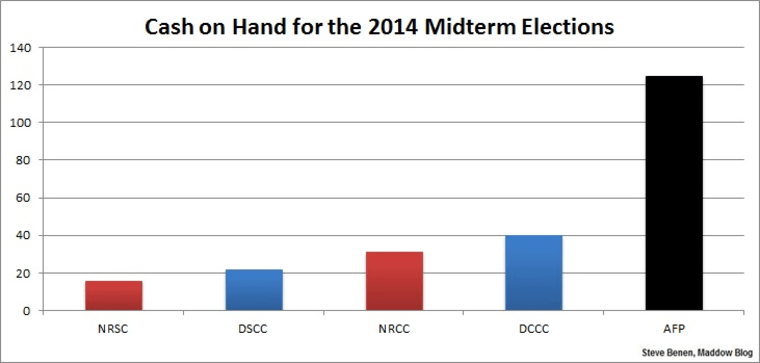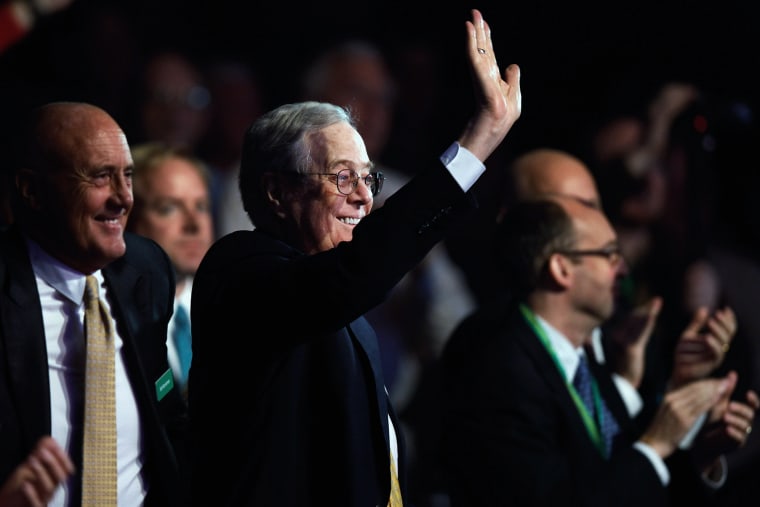There is no precedent under modern democratic norms for an outside political force with these kinds of resources.
The Koch brothers' main political arm intends to spend more than $125 million this year on an aggressive ground, air and data operation benefiting conservatives, according to a memo distributed to major donors and sources familiar with the group. The projected budget for Americans for Prosperity would be unprecedented for a private political group in a midterm, and would likely rival even the spending of the Republican and Democratic parties' congressional campaign arms.
Politico's Ken Vogel obtained a "Confidential Investor Update" provided to major donors in March, which included the $125 million projection. Note, however, that it may yet be exceeded.
Vogel's report quoted a source saying the figure is a "very conservative estimate. We're on track for more than that."
When talking about campaigns and fundraising, it's easy to get lost in a sea of zeroes, so let's provide some context. Indeed, it's probably time for a chart.

We just recently learned how much money the major-party campaign committees have in the bank for the 2014 cycle. For example, according to the most recent filings, the Democratic Congressional Campaign Committee, which is responsible for supporting Dem candidates in 435 U.S. House races, announced it has $40.2 million to be used in this year's midterms. Its GOP counterpart, the National Republican Congressional Committee, has about $31.2 million in cash on hand for the year.
On the Senate side, the Democratic Senatorial Campaign Committee has a little more than $22 million in the bank, while the National Republican Senatorial Committee has $15.9 million in cash on hand.
In fairness, these totals will fluctuate considerably as the elections draw nearer -- both in terms of receipts and expenditures -- and the above chart is intended to serve as just a snapshot of where things stand based on the most recent campaign-finance filings. But there is no realistic scenario in which any of the parties' campaign committees raise anywhere close to $125 million -- but that's the pile of cash the Koch's AFP is currently sitting on.
Indeed, as Vogel noted, the AFP's $125-million projected budget -- which may yet exceed that level -- "would also exceed the total 2012 fundraising hauls" of all four of the major party campaign committees.
Why should anyone care? Because considered in this light, Democrats aren't running against a rival party; they're running against two rival parties that happen to be ideologically aligned. It's a first for a major democracy -- there are major parties and then there's an outside group financed by billionaires that rival the major parties.
This does not, of course, guarantee Republican victories. Not only does the better-financed candidate occasionally lose, but the AFP has already spent $35 million so far this cycle and many of the races the group is trying to influence are leaning in Democrats' favor.
But there are structural elements that make the 2014 landscape tilt towards Republicans and a $125 million investment from a couple of far-right billionaires makes the existing dynamic all the more dramatic.
It's also a reminder that when the Associated Press reports that Democrats currently "have a roughly 3-to-1 advantage over Republicans in cash raised and banked through independent groups," just so long as we overlook the Koch brothers, that's painting a deeply misleading picture of reality.
